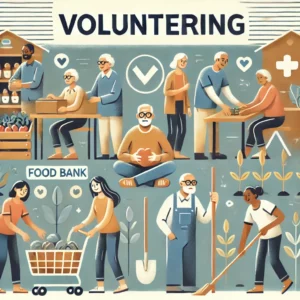Keeping Seniors Socially Active in Retirement: A Guide to Staying Connected and Engaged
Retirement marks a new chapter in life—one filled with opportunities to explore passions, meet new people, and enjoy a fulfilling lifestyle. But for many seniors, leaving the workforce can also mean losing daily social interactions, leading to feelings of isolation and loneliness.
The good news? Staying socially active in retirement is possible, beneficial, and easier than you think! Maintaining an active social life keeps your mind sharp, mood lifted, and overall health in check.
In this guide, we’ll explore why social engagement matters for seniors, practical ways to stay connected, and activities that promote lifelong friendships.
Why Staying Socially Active Matters in Retirement
Social connections aren’t just nice to have—they’re essential for mental, emotional, and even physical well-being. Here’s why staying socially engaged in retirement is so important:
1. Reduces Risk of Depression and Loneliness
Many retirees experience loneliness as their social circles shrink. Engaging with friends, family, and community groups provides a sense of belonging and emotional support, reducing the risk of depression.
2. Keeps the Brain Sharp
Social interactions act as a mental workout, helping seniors maintain cognitive function. Studies suggest that engaging conversations and stimulating activities can reduce the risk of dementia and Alzheimer’s disease.
3. Encourages Physical Activity
Social activities often involve movement, whether it’s dancing, walking, or playing sports. Staying active helps with mobility, flexibility, and overall physical health.
4. Boosts Self-Esteem and Purpose
Having an active social life gives seniors a reason to get up and get going each day. Volunteering, joining clubs, or mentoring younger generations instills purpose and fulfillment.
5. Strengthens Relationships with Loved Ones
Retirement is an excellent time to nurture family connections. Whether it’s spending time with grandchildren, joining family events, or traveling together, these interactions keep relationships strong.
How to Maintain and Expand Social Connections in Retirement
Many seniors worry about losing touch with friends and family post-retirement. But there are many ways to stay connected and build new friendships.
1. Stay in Touch with Old Friends
✔ Schedule regular phone or video calls to catch up.
✔ Plan monthly lunches, coffee meet-ups, or game nights.
✔ Reconnect with former colleagues through social media or reunions.
📌 Tip: Don’t wait for someone to reach out—take the initiative to schedule plans!
2. Make New Friends Through Clubs and Organizations

✔ Join a local book club, gardening group, or chess club to meet like-minded people.
✔ Look into senior centers or community events that offer social gatherings.
✔ Participate in religious groups, choirs, or volunteer organizations.
📌 Tip: Many communities offer free senior programs—check your local library, recreation center, or faith-based group.
3. Use Technology to Stay Connected
✔ Learn to use Zoom, FaceTime, or Skype for virtual family gatherings.
✔ Stay active on Facebook, WhatsApp, or Instagram to keep in touch with distant relatives.
✔ Try online games, trivia nights, or virtual book clubs to stay engaged.
📌 Tip: If you’re not tech-savvy, take a beginner-friendly tech class at a local community center.
4. Strengthen Family Bonds
✔ Spend time with grandkids—read, play games, or share family stories.
✔ Plan family trips, movie nights, or holiday gatherings.
✔ Offer to babysit or help with school pick-ups to stay involved in their lives.
📌 Tip: Storytelling nights are a great way to pass down wisdom and traditions while strengthening family ties.
Physical and Mental Activities That Promote Social Interaction
Combining physical movement with social engagement is the perfect way to stay healthy and connected.
1. Join Group Fitness Activities

✔ Sign up for yoga, tai chi, or water aerobics classes at a local gym.
✔ Join a walking or hiking group for regular outdoor activities.
✔ Try dancing lessons—ballroom, salsa, or line dancing can be a fun way to stay fit!
📌 Tip: Exercising with friends keeps you accountable and motivated.
2. Participate in Brain-Stimulating Activities
✔ Join a weekly board game or trivia night with friends.
✔ Take a creative writing or painting class.
✔ Enroll in an online or in-person course to learn something new.
📌 Tip: Keeping the brain active reduces the risk of memory-related illnesses.
3. Explore Hobbies That Encourage Socializing
✔ Try a gardening club and share homegrown produce with friends.
✔ Attend photography workshops or local art shows.
✔ Get involved in cooking or baking classes and swap recipes with new friends.
📌 Tip: Hobbies don’t just fill time—they introduce you to people who share your interests.
4. Volunteer for a Cause You Care About

✔ Help at a food bank, community garden, or animal shelter.
✔ Become a mentor or tutor for young students.
✔ Organize charity events or fundraising activities.
📌 Tip: Giving back creates a strong sense of purpose and fulfillment.
Social Activities Offered by Retirement Communities
If you live in a retirement community, you have built-in opportunities for socializing.
1. Take Advantage of Community-Organized Events
✔ Join movie nights, music performances, or dance socials.
✔ Participate in art, pottery, or knitting workshops.
✔ Attend guest lectures or educational seminars.
📌 Tip: Retirement communities offer structured activities that cater to different mobility levels and interests.
2. Get Involved in Leadership Roles
✔ Help organize community events or clubs.
✔ Join a resident advisory board to improve community life.
✔ Start a new group based on your hobbies—chess club, gardening, or photography.
📌 Tip: Taking on leadership roles keeps you engaged and ensures activities align with your interests.
Final Thoughts: Embrace an Active Social Life in Retirement
Retirement shouldn’t mean isolation—it’s an opportunity to reconnect, rediscover passions, and enjoy meaningful relationships.
📌 Quick Recap:
✅ Stay in touch with old friends and make new ones through clubs.
✅ Use technology to bridge the distance with family and loved ones.
✅ Engage in fitness, hobbies, and volunteer work to stay physically and mentally active.
✅ Take advantage of retirement community programs for social engagement.
🚀 Now it’s your turn! What’s your favorite way to stay socially active in retirement? Drop a comment below and share your experience! 🎉

My name is Larry, and I’d like to thank you for visiting Senior Citizens Fitness. I’m so passionate about staying fit in my later years. I hope you found some useful information here. Thanks again, and please subscribe and leave comments.
Larry Mac


